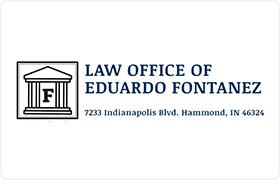 East Chicago Juvenile Law Lawyers, Indiana
East Chicago Juvenile Law Lawyers, Indiana
Sponsored Law Firm
-
 x
x

Click For More Info:
-
Law Office of Eduardo Fontanez
7233 Indianapolis Blvd Hammond, IN 46324» view mapCriminal Defense, Divorce & Family Law Former Judge & Former Deputy Prosecutor
I hope we can resolve any issue you may need. Here at the Law Office of Eduardo Fontanez, are focused on providing high-quality service and customer satisfaction.
800-697-7560
Warning! No lawyers found in this specified area.
Lawyers
1-0 of 0 matches



 Eduardo Fontanez Hammond, IN
Eduardo Fontanez Hammond, IN Practice AreasExpertise
Practice AreasExpertise